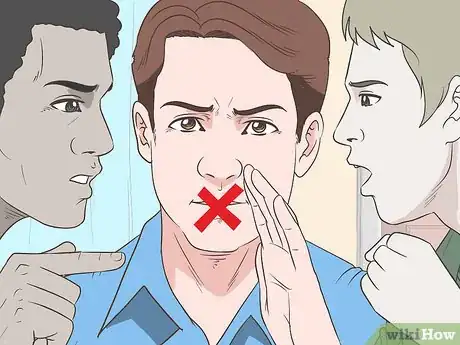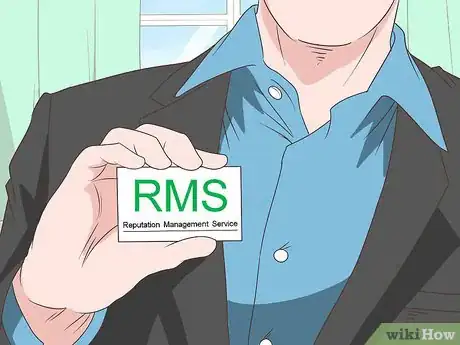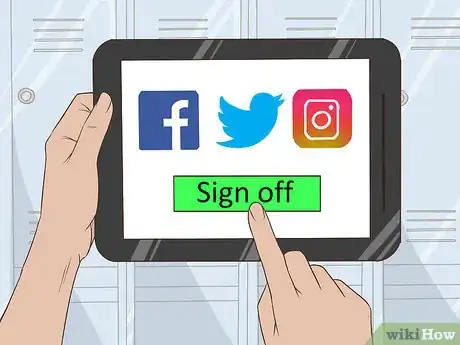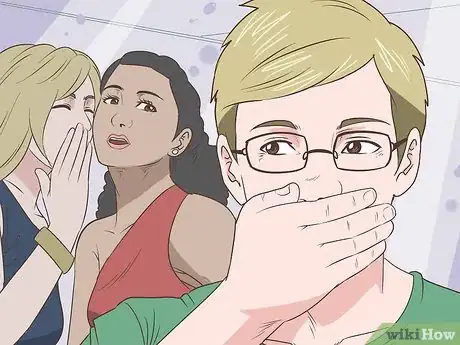This article was co-authored by Hyungbum Kang, MA, MSW, LCSW, MAC. Hyungbum Kang is a Licensed Clinical Social Worker based in Honolulu, Hawaii. With over a decade of experience, Hyungbum specializes in using an integrated therapeutic approach to treat ADHD, Anger Management, Depression, and other mental health and social work struggles. He received a Bachelor’s degree in English and Master’s degrees in Sociology and Social Work. Hyungbum earned an MBA from Hawaii Pacific University (HPU) and is working on his Doctor of Psychology from HPU. He is a member of the American Psychological Association, the International Honor Society in Psychology, the National Association of Social Workers, and the California Consortium of Addiction Programs and Professionals.
There are 15 references cited in this article, which can be found at the bottom of the page.
This article has been viewed 55,494 times.
A bad reputation can have a ripple effect on your personal and professional life. When you aren’t well-regarded by others, you’re at risk of losing friends, getting passed over for promotions, getting singled out by authority figures and not being taken seriously. The good news is that you can probably rebuild your bad reputation, although the process will take time and work. Start by doing damage control however you can. After that, work on strengthening your relationships with other people and moving forward in your life with confidence.
Steps
Doing Damage Control
-
1Assess how bad your reputation is and what part of your life is affected. It’s easy to be upset when someone says something negative about you, but don’t jump to conclusions about whether your reputation is ruined... Ask yourself how you’d view these comments if they’d been said about somebody else.[1]
- You don’t have to be universally liked to have a decent reputation.
- If your reputation really is damaged, figure out which sphere the damage has occurred in. For instance, you might have a bad reputation at work or school, but your reputation among your friends might be fine.
-
2Separate what you can control from what you can’t. You can’t control what people think about you, but you can control your own actions.[2] Focus only on what you can do to repair your reputation. Don’t waste your energy worrying about what other people are saying about you.[3]Advertisement
-
3Stop participating in damaging behaviors. If you know that some of your behaviors have caused your bad reputation, stop doing those things.[4] Think about why you behave this way, what it will take for you to learn different behaviors, and whether you could replace a negative behavior with a more positive one.[5]
- For instance, maybe you gossip about other people to feel included in your social circle. To change this behavior, you could look for a better way to feel included, such as helping your friends more often.
- Think about changing the kinds of people you surround yourself with as they may be contributing to your actions and negative reputation too.
-
4Address problems immediately. If you know that your reputation has taken a hit, jump into action right away. Acknowledge the problem and apologize if you need to.[6] If you’ve hurt or inconvenienced somebody, find a way to make amends.[7]
- Don’t just ignore the problem and hope it blows over. If you don’t acknowledge what people are saying, the damage could be even greater in the long term.
-
5Consider hiring a reputation management service. If your reputation has been damaged online, a reputation management service that specializes in SEO can help you recover. This type of service can help you bury negative content online by pushing positive content to the first pages of search engine results about you.[8]
- This strategy can be especially helpful if you are running an online business.
- It’s always a good idea to build a strong, positive online presence. Update your social media accounts regularly and consider starting your own website or blog.
- If you have no web presence of your own, it’s hard to defend yourself against bad reviews and other negative feedback online. Take the opportunities you have to explain your side and/or rectify customer dissatisfaction publicly online.
-
6Talk to a trusted adult. If you are a teen or young adult who is trying to bounce back from a bad rep, it may help to seek the advice of an adult you trust. A teacher, coach, or school counselor may serve as a great person to share your feelings and get unbiased advice.
- Go to the person and ask if you can speak to them privately. Share the details of your situation and ask them how you might bounce back from it.
Improving Your Relationships
-
1Look for reasons to cooperate with people. When you notice that a friend or coworker is having a hard time with something, reach out to help. Volunteer to participate in group projects, even if you usually prefer to work alone. When you go out of your way to help people, they will have a hard time holding a grudge against you.
- Be genuine when you help others. If it’s obvious that you’re just trying to improve your reputation, it won’t work.
-
2Admit your mistakes right away. Taking personal responsibility is an important skill to learn, and it can improve both how others view you and how you view yourself.[9] If you do something wrong, either intentionally or accidentally, own up to it immediately. Don’t try to cover up the mistake or blame it on somebody else. People will eventually find out if you lie about something, and the fallout will harm your reputation even more.[10]
- For instance, if you have a rep for lying or stealing, you want to show a sense of integrity whenever you can. If you find a wallet on the ground, don't keep it. Turn it in to someone who can see that it gets back to its rightful owner like a receptionist or police officer.
-
3Be positive and tactful. Try to find the good in every person and situation. If you’re in the habit of complaining about things or criticizing others, work on keeping those thoughts to yourself. Don’t ever gossip about or bad-mouth somebody behind their back, even if you no longer see or work with that person.[11] [Image:Bounce Back from a Long Time Bad Reputation Step 9 Version 2.jpg|center]]
-
4Meet new people. Your social circle affects the way people see you. If you spend a lot of time with people who are harming your reputation, consider finding a better group of friends. Join some new clubs or groups that interest you, or reach out to acquaintances you would like to know better.[12]
- Finding a new group of friends also gives you the chance to start over with people who aren’t biased against you.
-
5Take a break from social media. People these days often ignore their face-to-face relationships for those online. However, if you are trying to improve your reputation with those closest to you, you will need to give them more one-on-one time. Unplug from social media and try to spend more time with your closest friends and family.[13]
- Staying off social media may also help your reputation if you tend to post inappropriate things or form destructive relationships online. A break from social media may give you time to evaluate how you want to behave differently moving forward.
Moving On from the Past
-
1Pay attention to people's motives when they spread rumors. If someone has been slandering you, you might be understandably furious. Before you go looking for revenge, though, consider their motivations. Many people who spread rumors do so because they’re either envious of you or angry at you for something. Often, the best response is to keep your head high and ignore them.[14]
- If someone is saying things about you that obviously aren’t true, let your actions speak for you. Don’t get defensive or argue. Most people will be able to see that the rumors are false.
- When necessary, get support of people who can confirm that the rumors aren’t true.[15]
- If false rumors are really severe, they can be categorized as slander or defamation. If you can prove that there is malicious intent, you can file a lawsuit.[16]
- If one person tries to assassinate your character, it indicates a problem with them. If many people are saying bad things about you, though, the problem may be on your end.
-
2Show people you are trying by making an extra effort. Actions speak louder than words, especially when you are trying to fix a bad reputation.[17] Put extra effort into your work, school, and relationships. When people already think poorly of you, it takes extra evidence to change their minds, so be prepared to over-deliver for a while.[18]
- For instance, if you have a reputation for being a lazy student, you could change people’s perception of you by participating in class discussions every day.
-
3Make some changes in your life. If you aren’t happy with your current identity, reinvent yourself. Think about what kind of person you want to become, and then make small changes that will help you get there. If you develop any feelings of shame or guilt, be sure to address those first; you’ll need to have a positive opinion of yourself before you can convince others to. Improving yourself takes time and effort, but it can help you leave a negative reputation behind you.[19]
- Stay true to yourself. It’s normal and healthy to change as a person over time, but don’t try to become someone you aren’t.
- See a professional for help if you have consistent low self-esteem for a prolonged period of time.
-
4Be patient and give people time to see you differently. Your reputation is made up of lots of individual factors, such as your reliability, helpfulness, and personal presentation. It takes time to improve all these areas of your life, so don’t expect your reputation to change overnight. Be patient and persistent, even when it seems like your efforts aren’t paying off.[20]
Expert Q&A
-
QuestionHow do you heal a ruined reputation?
 Wes PinkstonWes Pinkston is a Certified Holistic Life Coach and the Founder of Wes Pinkston Life Coaching. With more than five years of experience, he specializes in helping people achieve greater fulfillment and understand their full potential. He received his Holistic Lifestyle Coach Certification from The CHEK Institute.
Wes PinkstonWes Pinkston is a Certified Holistic Life Coach and the Founder of Wes Pinkston Life Coaching. With more than five years of experience, he specializes in helping people achieve greater fulfillment and understand their full potential. He received his Holistic Lifestyle Coach Certification from The CHEK Institute.
Certified Holistic Life Coach The most important thing is to realize why the bad reputation was created in the first place. Bring awareness to the source of the problem and begin the journey of building your new reputation one act at a time. Remember that your mistakes are learning lessons, not failures.
The most important thing is to realize why the bad reputation was created in the first place. Bring awareness to the source of the problem and begin the journey of building your new reputation one act at a time. Remember that your mistakes are learning lessons, not failures. -
QuestionHow long does it take to repair a damaged reputation?
 Wes PinkstonWes Pinkston is a Certified Holistic Life Coach and the Founder of Wes Pinkston Life Coaching. With more than five years of experience, he specializes in helping people achieve greater fulfillment and understand their full potential. He received his Holistic Lifestyle Coach Certification from The CHEK Institute.
Wes PinkstonWes Pinkston is a Certified Holistic Life Coach and the Founder of Wes Pinkston Life Coaching. With more than five years of experience, he specializes in helping people achieve greater fulfillment and understand their full potential. He received his Holistic Lifestyle Coach Certification from The CHEK Institute.
Certified Holistic Life Coach It depends on the reason why you got the reputation. Remember, though, that every day is a new day and that you have the option to choose how you will respond to each situation. If you do happen to make a mistake again, learn from it, own it and start over again.
It depends on the reason why you got the reputation. Remember, though, that every day is a new day and that you have the option to choose how you will respond to each situation. If you do happen to make a mistake again, learn from it, own it and start over again. -
QuestionI have a reputation of being a weird person who isn't worth knowing. I've tried stopping being weird, but it just doesn't work. I can't change. What now?
 Paul Chernyak, LPCPaul Chernyak is a Licensed Professional Counselor in Chicago. He graduated from the American School of Professional Psychology in 2011.
Paul Chernyak, LPCPaul Chernyak is a Licensed Professional Counselor in Chicago. He graduated from the American School of Professional Psychology in 2011.
Licensed Professional Counselor "Weird" is a big label. Try to narrow down what specifically makes others view you as weird. You may want to ask others you trust to give you their objective opinion on what you do that is "Weird." Then try to work on improving these specific things one at a time.
"Weird" is a big label. Try to narrow down what specifically makes others view you as weird. You may want to ask others you trust to give you their objective opinion on what you do that is "Weird." Then try to work on improving these specific things one at a time.
References
- ↑ https://www.scientificamerican.com/article/psychology-s-credibility-crisis-the-bad-the-good-and-the-ugly/
- ↑ Wes Pinkston. Certified Holistic Life Coach. Expert Interview. 18 January 2022.
- ↑ https://www.apa.org/gradpsych/2007/03/matters
- ↑ Wes Pinkston. Certified Holistic Life Coach. Expert Interview. 18 January 2022.
- ↑ https://www.psychologytoday.com/blog/in-flux/201306/how-change-your-behavior-good
- ↑ Wes Pinkston. Certified Holistic Life Coach. Expert Interview. 18 January 2022.
- ↑ https://positivepsychology.com/self-worth/
- ↑ https://ctb.ku.edu/en/table-of-contents/structure/hiring-and-training/job-descriptions/main
- ↑ Wes Pinkston. Certified Holistic Life Coach. Expert Interview. 18 January 2022.
- ↑ https://positivepsychology.com/self-acceptance/
- ↑ https://www.health.harvard.edu/blog/staying-positive-during-difficult-times-2020100121047
- ↑ https://www.psychologytoday.com/us/blog/the-introverts-corner/201202/survey-says-how-meet-new-people
- ↑ https://www.psychologytoday.com/us/blog/automatic-you/202005/learn-how-avoid-distraction-in-world-thats-full-it
- ↑ https://psychcentral.com/pro/recovery-expert/2020/03/how-to-protect-yourself-from-others-negative-energy#1
- ↑ Hyungbum Kang, MA, MSW, LCSW, MAC. Licensed Clinical Social Worker. Expert Interview. 26 July 2021.
- ↑ Hyungbum Kang, MA, MSW, LCSW, MAC. Licensed Clinical Social Worker. Expert Interview. 26 July 2021.
- ↑ Wes Pinkston. Certified Holistic Life Coach. Expert Interview. 18 January 2022.
- ↑ https://hbr.org/2015/09/you-really-can-change-your-reputation-at-work
- ↑ https://learningcenter.unc.edu/tips-and-tools/changing-habits/
- ↑ https://www.psychologytoday.com/us/blog/emotional-freedom/201209/the-power-patience











































































